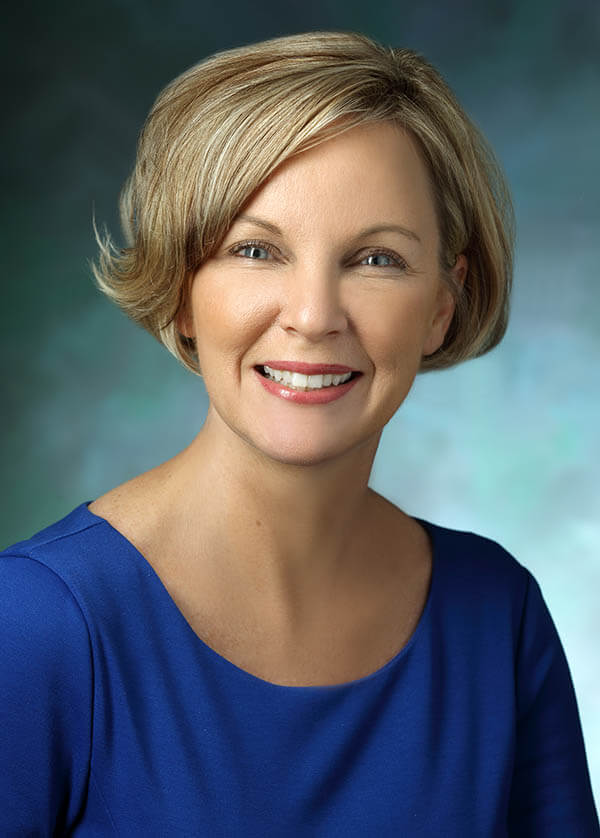Meet Our Leaders
Women in Leadership
Deborah Baker, D.N.P., AG-ACNP, NEA-BC, F.A.A.N.
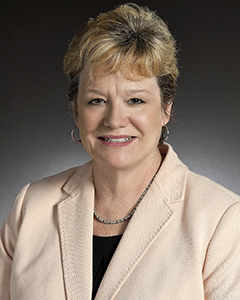 Deborah Baker - At Johns Hopkins since 1992
Deborah Baker - At Johns Hopkins since 1992 Senior Vice President of Nursing, Johns Hopkins Health System
Vice President of Nursing and Patient Care Services, The Johns Hopkins Hospital
-
Before attending The Johns Hopkins University for a second bachelor’s degree in the accelerated program in nursing, I worked for six years as a psychiatric assistant at a private psychiatric hospital. I was intrigued with the emphasis on inquiry at Johns Hopkins and paid back a scholarship to stay and work at The Johns Hopkins Hospital. I knew I wanted to directly impact the quality of the patient care experience and Johns Hopkins was the place to learn and grow.
-
I stay at Johns Hopkins Medicine because of the opportunity to be part of care and leadership teams that value evidence-based practice, nursing autonomy and the opportunity to become part of something bigger than one individual. Motivated individuals who take advantage of opportunities can reinvent themselves several times at Johns Hopkins.
-
After working as a staff nurse, I returned to school for a master’s degree and a nurse practitioner certification. Working as a nurse practitioner on the trauma and general surgery service, I was motivated to interpret the complex care delivery system to our most vulnerable adult patients and work to improve accessibility and comfort. I aspired to leadership positions to make the greatest impact on care strategically by developing and optimizing nursing roles as integral contributors on multidisciplinary teams. I took advantage of opportunities to participate in system strategic planning committees. I earned a doctorate degree and served as the interim vice president for nursing at The Johns Hopkins Hospital, and was promoted to the inaugural system role. A critical aspect of my role is to articulate the value proposition an optimized nursing workforce has on Johns Hopkins Medicine strategic objectives.
-
Any of the accomplishments that improved the patient experience by including the voice of the patient and family and all members of the care team at the front line. I have innovated in the areas of care delivery and unique nursing roles. Leading our organization to achieve Magnet status for the fourth time is an effort that requires strong multidisciplinary relationships, common values and goals.
-
Keep asking questions and challenge all assumptions. If you are focused on strategic goals and can convene diverse teams around common goals, there is a lot that can be accomplished regardless of gender. You have to speak up and educate others about the value your team brings to the work. Have a mentor and be a mentor. I think as an academic and caring community, we must be deliberate in our inclusion of all who bring unique talents to solve complex issues.
Jessica Bienstock, M.D., M.P.H.
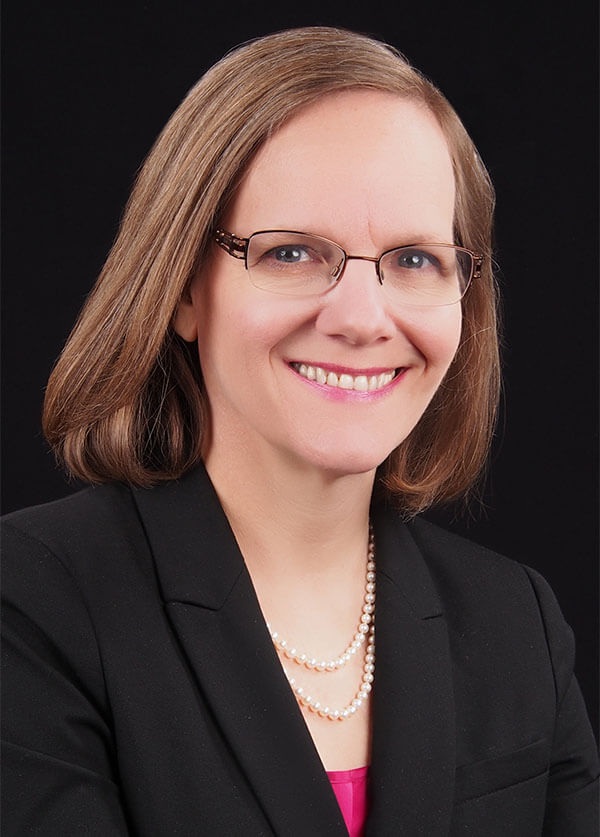 Jessica Bienstock - At Johns Hopkins since 1994
Jessica Bienstock - At Johns Hopkins since 1994 Professor
Associate Dean for Graduate Medical Education
-
Johns Hopkins had everything I was looking for as a trainee. Hopkins offered a plethora of interesting patients, outstanding educational opportunities and an opportunity to serve a population that was very much in need of excellent physicians. I remember being in awe of the physicians I met when I first came to Johns Hopkins. They were so confident in the care they provided. They not only read the primary literature, they wrote it. That was the kind of doctor I wanted to be.
-
Being a Johns Hopkins physician allows me to have the best of all possible worlds. I get to provide excellent patient care alongside world-class colleagues, all of whom are remarkably collegial. I am able to think about the “big picture” — where medical education should go — and then help lead our journey to that future. Hopkins takes good physicians and, by putting us within excellent teams, allows us to accomplish great things. We push the boundaries of medicine and improve the health of the patients we care for ourselves and that of the patients our learners will care for in the future.
-
I first found a love of leadership when I was an administrative chief resident. I really liked looking at “big picture” solutions that could reach across silos and solve problems for many different stakeholders. Early in my career I became the Ob/Gyn medical student clerkship director because I really enjoyed teaching. Residency program director was the next logical step in education leadership. I also really enjoy looking at challenges on an institutional and national level. Many programs and institutions have the same issues, and helping others improve their own programs is very gratifying.
-
When I came to Johns Hopkins I never imagined that I would become an education leader here and nationally. I am very proud of the excellent residency programs we have built and continue to improve. I am excited that our training programs produce great physicians who truly do become leaders in their fields. I am also proud of the national recognition our program directors and faculty have gained as leaders in education in their specialties and at the Accreditation Council for Graduate Medical Education (our accrediting body).
-
Sit at the table! You may think you are junior and don’t belong with “the big boys,” but you do. People at Johns Hopkins are very welcoming. They want to hear your voice and learn from your ideas. Remember that the distance between you and someone who is in leadership always looks longer when you are “looking up” than it does to the leader with whom you are talking. Also, if you can write about and publish the innovative things you are doing, you should. This will disseminate your ideas and help get you promoted.
Carolyn Carpenter, M.H.A., F.A.C.H.E.
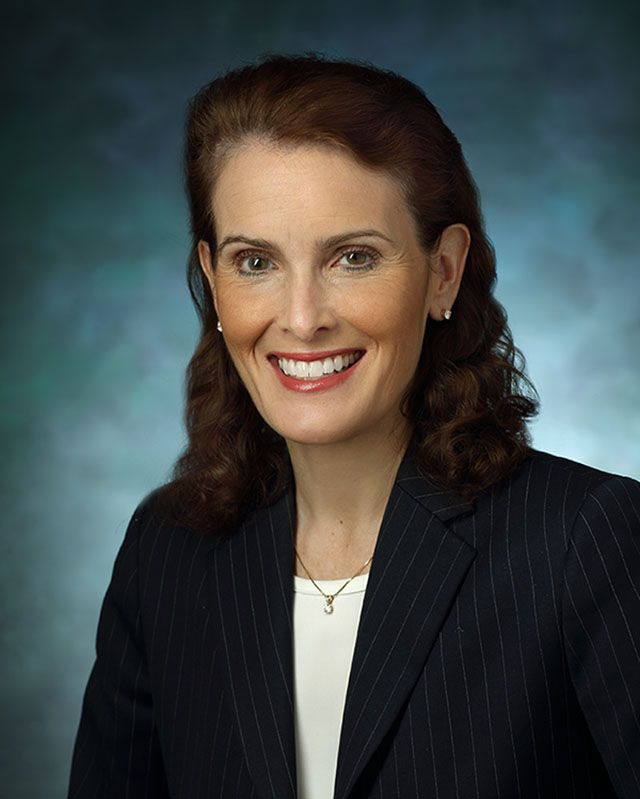 Carolyn Carpenter - At Johns Hopkins since 2020
Carolyn Carpenter - At Johns Hopkins since 2020 President, National Capital Region, Johns Hopkins Medicine
-
Having a background in both academic medical center and community hospital leadership, I was intrigued with the opportunity to work within both contexts. The Johns Hopkins Health System’s National Capital Region gives us the chance to take what is best about each environment and leverage this to improve the health of our families, friends and neighbors.
-
I started my career in academic administration working for the Department of Medicine at the University of Pennsylvania (my alma mater), then went to graduate school in Virginia and had the opportunity while there to work at another academic medical center. I spent 20 years at Duke Health, and then three years with Sentara Healthcare, a 12-hospital community system based in Virginia.
-
I am most proud of the teams I’ve been able to build and the collective and individual successes that have resulted. Whether it be creating a new entity, advancing an impactful initiative or developing a talent that changed the course of an organization, the people I’ve been privileged to lead have given my career meaning.
-
Be you. Learn what your unique and exceptional talents are and focus on utilizing those strengths. Don’t waste time being concerned about where your talents don’t lie, but hone in on where they do. Utilizing those skills and abilities that are beyond others’ is where you will have the most impact while being your best you.
Deidra Crews, M.D., Sc.M.
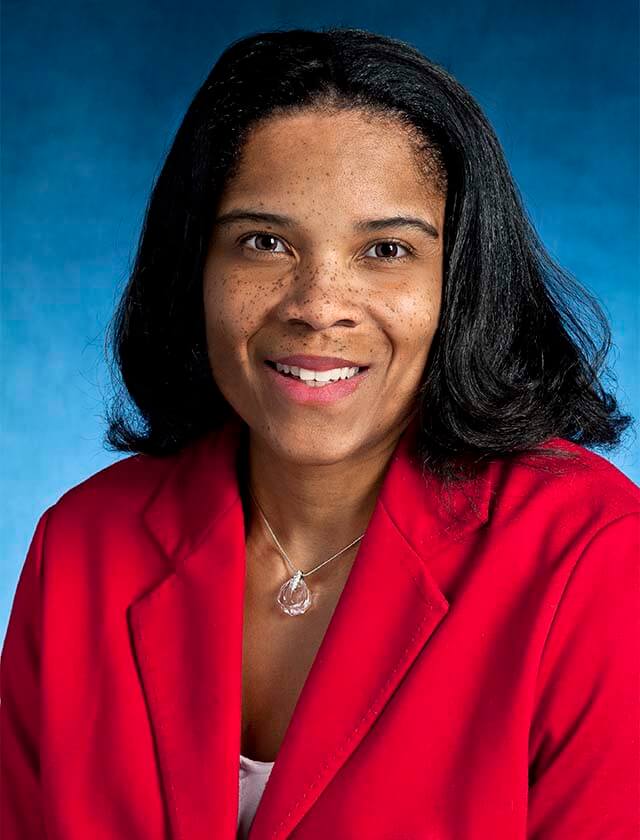 Deidra Crews - At Johns Hopkins since 2003
Deidra Crews - At Johns Hopkins since 2003 Associate Professor of Medicine
Associate Vice Chair for Diversity and Inclusion
-
I was interested in completing residency training at an institution that could offer me strong clinical training and expose me to opportunities in clinical research.
-
The brilliant colleagues and trainees at Hopkins keep me stimulated and excited about our work together.
-
I was appointed chair of the Department of Medicine Diversity Council in 2013 after several years of serving on the council. Following a transition to a new department director who restructured the vice chair positions, my position was elevated to associate vice chair for diversity and inclusion.
-
I am very proud of the work my colleagues and I have done advancing our understanding of disparities in kidney disease and hypertension, and testing approaches to eliminating them. I am also tremendously proud of the young people I have had the honor of mentoring through the Johns Hopkins Initiative for Careers in Science and Medicine.
-
Seek leadership opportunities that align with your personal mission and values. Develop an understanding of the value of your time, and establish boundaries to protect it. Know that just because you have not seen someone who looks like you in a certain position does not mean that you cannot attain it and excel at it. Never tell yourself “no” — apply for all opportunities that pique your interest, and give others the chance to assess you on your merit.
Lee Daugherty Biddison, M.D., M.P.H.
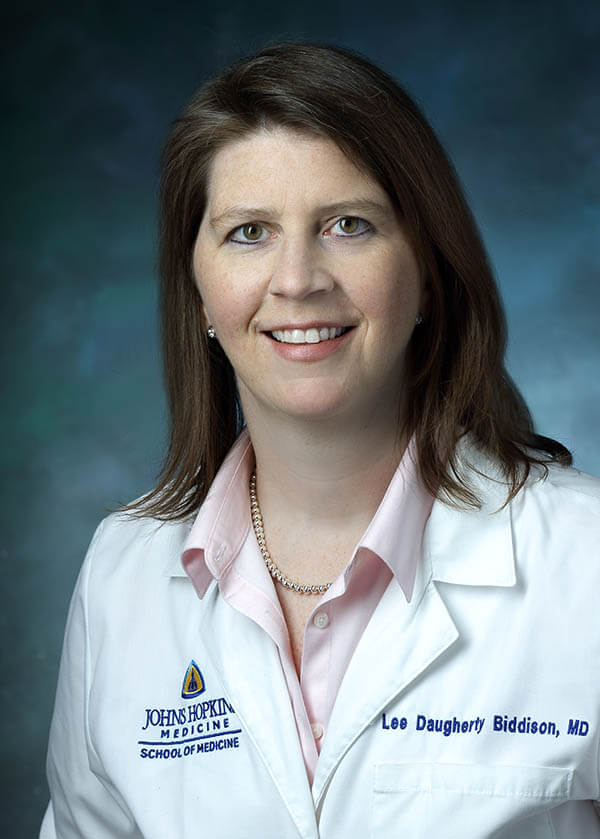 Lee Daugherty Biddison - At Johns Hopkins since 2004
Lee Daugherty Biddison - At Johns Hopkins since 2004 Associate Professor of Medicine
Chief Wellness Officer, Johns Hopkins Medicine
-
I came to Johns Hopkins Medicine in 2004 for fellowship training in pulmonary and critical care medicine. I was drawn here by the wonderful faculty, the rich training opportunities and the chance to be part of an organization that was — and still is — changing the world.
-
I decided to stay at Johns Hopkins Medicine once I finished my training because of the extraordinary mentorship I had found here, as well as the colleagues who consistently challenged me to give my best every day. I’ve remained committed to Johns Hopkins Medicine because of the dynamic, engaged leadership all around me and the joy that is to be found in living out the Johns Hopkins Medicine mission.
-
My leadership journey began when I became part of the faculty in 2008. At that time, I joined the emergency management team as medical control chief to provide physician support and input for hospital disaster response planning. In 2013, I left that role and became vice chair for clinical affairs in the Department of Medicine, which allowed me to focus on clinical operations not just during disasters but also on a routine basis. This work helped me to understand in a very detailed way the challenges to wellness and drivers of burnout that face Johns Hopkins Medicine employees in their daily work. In the fall of 2018, after serving on the Dean’s Task Force on Joy in Medicine, I was asked to step into the role of Johns Hopkins Medicine’s inaugural chief wellness officer.
-
I am most proud of the interprofessional, interdepartmental relationships I’ve been able to form. These partnerships have allowed us to meet and overcome significant operational challenges.
-
Find a female leader you admire to mentor you, ask lots of questions and listen closely! Learn to respond (not just react) to the challenges you face and pace yourself.
Michelle Glennon, J.D.
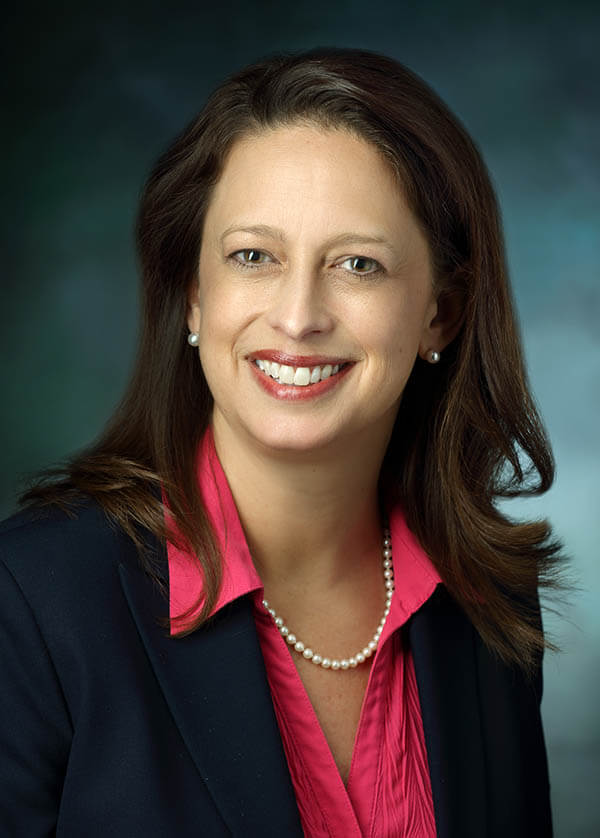 Michelle Glennon - At Johns Hopkins since 2001
Michelle Glennon - At Johns Hopkins since 2001 Associate Vice President, Fund for Johns Hopkins Medicine
-
In my role as a fundraiser, it is important for me to believe in the mission of the organization that I am representing. The mission of Johns Hopkins Medicine inspires me and, being a life-long Baltimorean, there is a real sense of pride in representing JHM.
-
I have stayed at Hopkins for the past 17 years because I have been able to advance professionally, continue to be inspired by the mission of JHM and enjoy the drive for excellence and dynamic atmosphere where I continue to learn and grow.
-
I proactively sought out my current role as associate vice president, which I have held since the fall of 2014. Prior to that, I was the director of a central University/Medicine fundraising office. To be successful in my central role, it was essential to build positive working relationships throughout the Hopkins enterprise and demonstrate the value-add that my team brought to schools and medical divisions. I formed strong partnerships with medicine fundraising leadership and colleagues. Although not the traditional candidate (which would have come directly from a medical fundraising department), I believe my success in my central role – not just dollars raised but also being known as a collaborator – paved the way for me to be the successful candidate from the national search.
-
As associate vice president I am most proud of my work around morale/culture building and integrating the partner hospitals into the Development and Alumni Relations organization.
-
Be proactive about building internal relationships with people you can learn from and with people who will advocate for you; know that your high quality work will sometimes help you move to the next level, but it won’t always do so on its own and you need to advocate for yourself; embrace new opportunities even when you don’t think you’re 100 percent ready for them – opportunities rarely come at the right time and in the perfect way but the good ones are worth the risk.
Rachel Green, Ph.D.
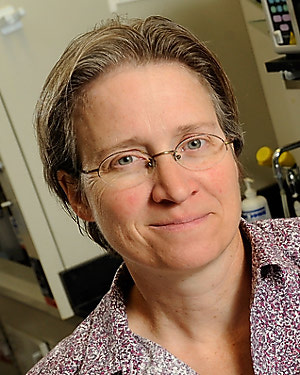 Rachel Green - At Johns Hopkins since 1998
Rachel Green - At Johns Hopkins since 1998 Director of the Department of Molecular Biology and Genetics at the Johns Hopkins School of Medicine
Bloomberg Distinguished Professor
-
In the late 1990s, my husband [Brendan Cormack] and I were doing our post-docs in California and fielding offers, and Johns Hopkins stood out. I really liked the vibe of the Department of Molecular Biology and Genetics. They came off as incredibly smart, engaged, cohesive, and family-oriented, which was everything I needed.
I also have deeper family ties in Baltimore: My parents grew up here and my brother settled here. So it all made sense.
-
I’ve been happy here at Hopkins. I’ve had a lot of resources and funding that have supported my scientific life for a long time. In my lab I’ve worked with wonderful students and post-docs. I’ve been a part of hiring young people and building this place and I’m invested.
-
At a certain point, they needed a new person to direct the grad program for Biochemistry, Cellular and Molecular Biology, and my colleagues convinced me to go for it. I served as director from 2018 to 2023. Recently there was an opportunity to step up to lead the Department of Molecular Biology and Genetics, and I was named director. I also have experience leading my section of the National Academy of Sciences for three years.
-
I’m proud of building a really outstanding lab here. The core of my group has been an awesome, hard-working, engaged group of scientists who are kind to one another and make substantial contributions to science.
The lab has adapted to changing times and our most recent work focuses on connecting the ribosomes to signaling pathways in mammalian and bacteria cells. We’re really excited about the work we’re doing.
-
My advice is do your best work and respect everyone around you, and in that way you earn your own respect.
Over the years I’ve seen an evolving awareness of the challenges women face in the workplace and particularly STEM fields, but I can say I’ve personally had a lot of positive experiences and have found opportunities and respect at every level.
Sherita Golden, M.D., M.H.S.
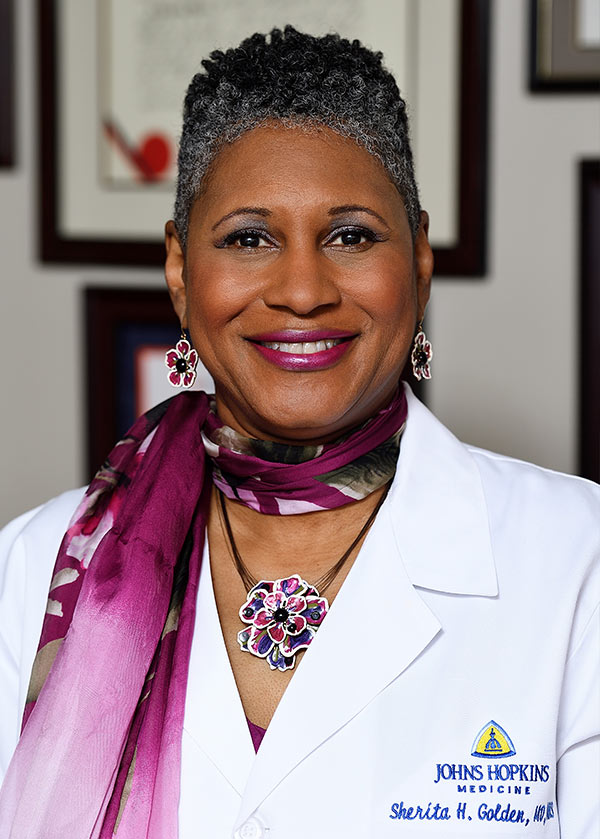 Sherita Golden - At Johns Hopkins since 1995
Sherita Golden - At Johns Hopkins since 1995 Hugh P. McCormick Professor of Endocrinology and Metabolism
-
I decided to join Johns Hopkins Medicine because of the excellent scientific mentorship and the opportunity to combine molecular endocrinology with population science through collaborations between the schools of medicine and public health. I also have a passion for caring for the underserved who have diabetes. Thus, the East Baltimore community was a natural fit for all of my interests.
-
I have decided to stay at Johns Hopkins Medicine for the rich scientific and clinical environment and the opportunity to work with such outstanding trainees and students at every level. Working with young future scientists and clinicians and developing them is a way for me to give back to the Johns Hopkins community that contributed so richly to my own professional development. I also have the opportunity to now contribute as a leader to furthering the Johns Hopkins Medicine mission.
-
For a number of years I led the Johns Hopkins Hospital Glucose Management Program and the Inpatient Diabetes Management Service. This gave me insight into hospital operations and how to implement clinical policies and systems changes. I learned that I loved clinical operations in addition to being a physician-scientist. These program-building and scientific experiences prepared me to successfully compete for the RFA for the position of executive vice chair of the Department of Medicine, a role that I have held for the past three years. I am now feeding all of my passions.
-
As executive vice chair, I am most proud of having collaborated with leaders in nursing and administration in my department to launch a Civic Engagement Initiative to enhance our connection to our surrounding Baltimore community and to enhance employee engagement in our department. This initiative was launched in response to the Freddie Gray Riots in 2015. I was also extremely honored when the Johns Hopkins Inpatient Glucose Management Team and I received an inaugural Innovations in Clinical Care Award in 2015. And of course, being the 198th woman professor was a very proud moment!
-
My advice is to determine what your passions are and make sure that you are spending time and gaining skills to pursue and lead in those areas. Don’t be afraid to FAIL – First Attempt In Learning. If you don’t take risks, it will be more difficult to pursue your dreams. Also, tell other leaders who are your mentors what your goals are – this will allow them to sponsor you. Finally, be certain to maintain the proper priorities – family, friends and well-being are extremely important. This means that you may need to choose the timing for leadership that dovetails with your life stage.
Melissa Helicke, M.B.A., M.H.A.
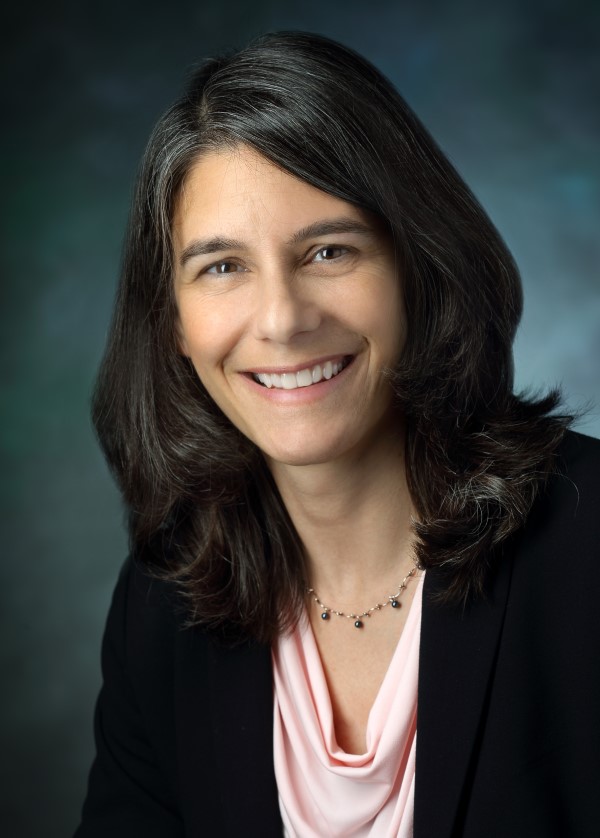 Melissa Helicke - At Johns Hopkins since 1996
Melissa Helicke - At Johns Hopkins since 1996 Vice President, Operations and Chief Operating Officer, Johns Hopkins Community Physicians
-
I came to JHM through the JHM administrative fellowship program. I was so impressed with the leadership team that I met during the interview process. Before the interview, I assumed that Hopkins would feel “stuffy” and intimidating. But I remember being surprised that all of the people I met were friendly, warm and really smart. I knew Hopkins was where I wanted to be.
-
For three reasons: 1) My initial impression of Hopkins was correct. I have been surrounded by super smart, passionate, driven and caring people. 2) The work is always challenging. I am always learning. I feel fortunate to have been given opportunities to learn and grow, within current roles and through new roles. 3) I regularly feel intrinsic reward. Although I am not clinical, in my own way, I feel that I am contributing toward the JHM tripartite mission and improving health for our communities. The work is meaningful to me.
-
Definitely a combination of many things. I’ve enjoyed asking lots of questions and taking on new responsibility. I have found mentors that have helped me build on my strengths, work on my weaknesses and create opportunity. I am lucky to have been surrounded by talented colleagues that I learn from every day. I am very lucky to have worked for leaders that have allowed me, without guilt, to be a successful employee and be an engaged mother of three kids. Without that support, I may not have stayed on the path.
-
That’s hard to answer. I feel very proud to have been at Johns Hopkins Bayview Medical Center during the time that we — many people! — transitioned it from a wonderful community hospital to the thriving academic medical center that it is today. Although it has been an extraordinarily difficult time, I feel very proud of how JHCP responded to the COVID pandemic, pivoting quickly to telemedicine and supporting our employees and patients through this unprecedented time. I would be remiss if I didn’t talk about how excited I am about JHCP’s primary care practice growth and recent practice integrations, all part of the JHM ambulatory road map.
-
Be curious, say yes to new assignments, work hard, find a good mentor and be a good mentor to others. Be true to yourself and your goals, try not to get caught up in what you think others expect of you. Find your voice, get comfortable communicating with both men and women and a variety of different personalities. Learn from all of the leaders around you, take what inspires you from each and create your own leadership style.
-
I came as a medical student and never left.
-
I love working in an environment with smart and talented people who challenge me.
-
My first leadership role was as the program director for the radiology residency. From there I moved to Bayview as the interim chair of radiology. This led me back to JHH as vice chair of operations, then executive vice chair. I moved into the interim director role when the prior director left and finally became the director of radiology on Oct 1, 2017.
-
I am most proud of becoming the first female director of radiology at Johns Hopkins. It is a reflection of my hard work, tenacity and grit.
-
- Speak up. Get invited to the table and get involved.
- Confidence is as important as competence.
- Be visible. Learn the value of networking.
Lisa Ishii, M.D., M.H.S.
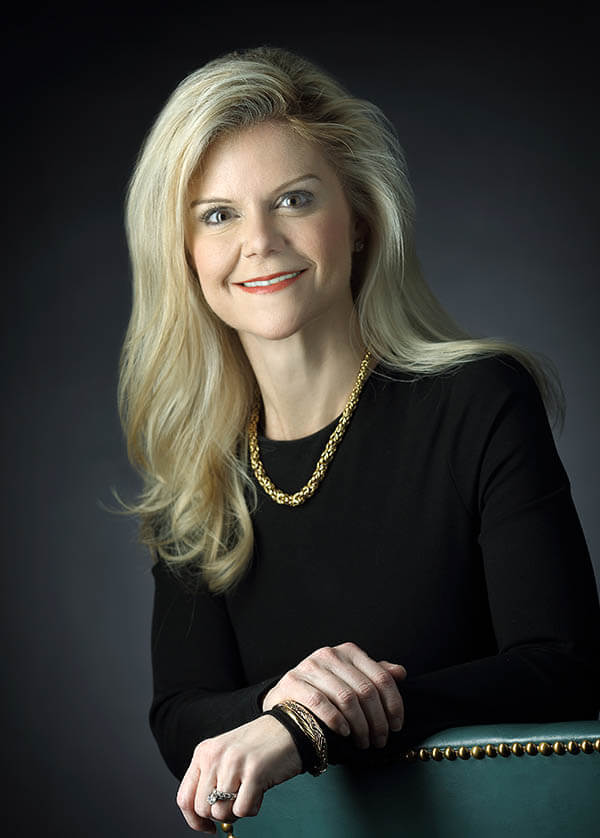 Lisa Ishii - At Johns Hopkins since 2000
Lisa Ishii - At Johns Hopkins since 2000 Senior Vice President for Operations, Johns Hopkins Health System
-
I decided to join Johns Hopkins Medicine as a faculty member after completing my residency and fellowship training because the culture and commitment to mission resonated with me.
-
The people and the culture. Every single day I have the opportunity to work with exceptionally talented individuals who share a passion for excellence in patient care, research and education. There is tremendous diversity in thought and approach across the health system and across the school of medicine. That diversity, coupled with collegiality, drives innovation.
-
I became interested in health system leadership early on in my faculty career. I was elected by my department to serve on the Johns Hopkins University School of Medicine faculty senate. Soon thereafter I was elected to chair the faculty senate, and that gave me a wonderful platform to work with colleagues across the school of medicine and beyond. When I completed my terms in the faculty senate, I was invited to serve in the Office of Johns Hopkins Physicians as a medical director for clinical integration, which further allowed me to work on projects to support integration across the health system. That role led me to my current position of senior vice president for operations for the Johns Hopkins Health System.
-
Establishing an infrastructure for clinical care pathway development to support clinical teams focused on driving value in health care.
-
To discover new oceans, you have to have the courage to lose sight of the shore.
Jennifer Lee, M.D.
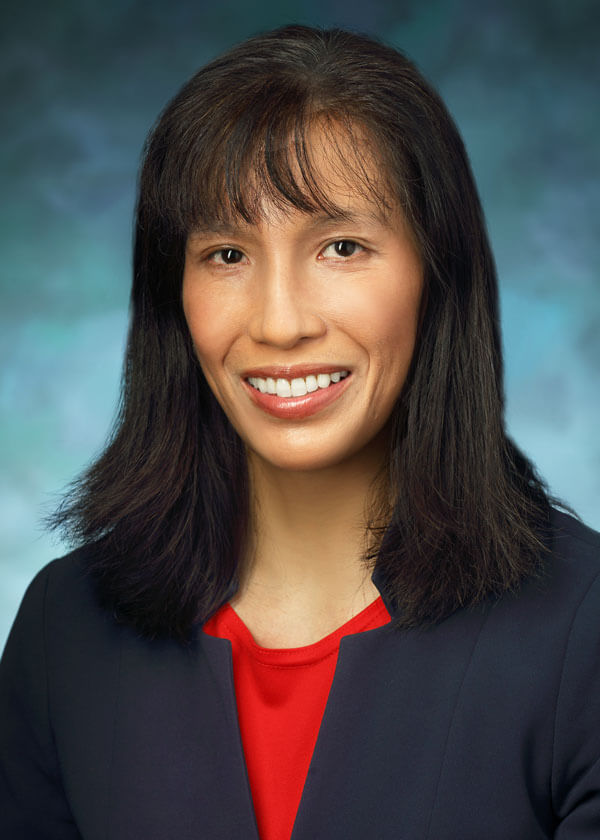 Jennifer Lee - At Johns Hopkins since 2010
Jennifer Lee - At Johns Hopkins since 2010 Senior Associate Dean, Office of Women in Science and Medicine
-
I chose Johns Hopkins for medical school because I wanted to train and eventually work in an urban environment with a diverse patient population. My mentors at the University of Colorado also told me about Mary Elizabeth Garrett’s work many decades ago to ensure that women could train as physicians at Johns Hopkins. I wanted exposure to rigorous science in addition to clinical and teaching excellence, and Johns Hopkins is a leader in each of these areas. Back when I applied to medical school, a member of the admissions committee personally called every accepted student. I will always remember that phone call.
-
After receiving my medical degree here, I completed residencies in pediatrics and anesthesiology followed by fellowship training in pediatric anesthesiology and pediatric critical care medicine at Hopkins. I stayed as faculty to continue working with my research mentors and to expand the research collaborations that I started as a trainee. The clinical cases that we encounter at Hopkins are often very challenging — there is rarely a dull moment. And education is at the core of everything we do. I knew that if I stayed at Hopkins, I would embark on a career of constant growth and opportunity.
-
I founded the Women’s Empowerment and Leadership Initiative (WELI) to support pediatric anesthesiologists and their career advancement. I have developed incredible relationships through WELI, and I am so grateful to work with the WELI protégés and advisors. Eventually, I became the associate vice chair for faculty development and affairs in the Department of Anesthesiology and Critical Care Medicine, and then I joined the Johns Hopkins Faculty Affairs and Development Board within the Office of Faculty Development. I contributed to and eventually led several faculty development projects at Hopkins, and I learned something new every time. When the Office of Women in Science and Medicine application opened, my colleagues encouraged me to apply to this amazing position.
-
I am most proud of my two sons. Being a working parent is extraordinarily difficult. I am also very proud of the translational brain injury research program that I helped build with collaborators around the world. We applied our work in preclinical models to design small, then large, clinical trials that have impacted clinical guidelines. I am also very proud of WELI. This organization is designed to support people of all genders who want to advance their careers. Working with and learning from brilliant scientists, clinicians, educators and leaders has made me a better physician-scientist. I will pay this forward.
-
Take an active role in your career development and path. Think about what brings you joy, and try to align that with your career. Advocate for yourself. Ask for opportunities to learn new skills, join and lead projects, and obtain invited lectures. You do not need to accomplish everything and have every possible skill to be ready to lead a project or apply for a position. You might already be prepared! Every position requires learning new skills, so stay open to learning. Sponsor, mentor and coach the people around you. Pave the way so others can pursue their goals too.
Rachel Levine, M.D., M.P.H.
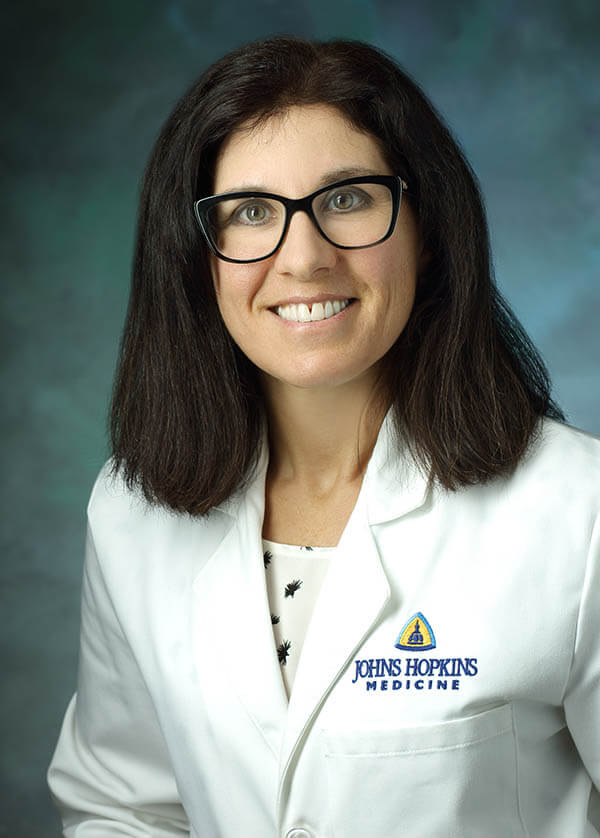 Rachel Levine - At Johns Hopkins since 2001
Rachel Levine - At Johns Hopkins since 2001 Associate Professor and Associate Dean for Faculty Educational Development
-
I came to Johns Hopkins to complete a fellowship in general internal medicine (GIM) with a focus on medical education. I picked the fellowship at Hopkins because of the outstanding reputation of the medical education training program in GIM.
-
I love working with incredibly talented and dedicated colleagues. In my different roles I am able to engage in a variety of meaningful professional activities. I do feel like I am making a difference. I am happy to come to work each day.
-
I have two leadership roles: associate vice chair for women’s academic careers in the Department of Medicine and associate dean for faculty educational development in the school of medicine. I feel very fortunate that both of these roles allow me to do work that I am very passionate about and which I feel that I am trained to do. I have been involved with the Task Force on Women’s Academic Careers in the Department of Medicine since I was a fellow. This was great “training” for a leadership role because it gave me exposure to women role models and access to departmental leadership.
-
I am extremely proud of how the Women’s Task Force has evolved into a recognized “player” in addressing gender disparities. I believe that the task force has raised awareness about issues related to transparency around leadership and promotion and salary equity. Although it is a small thing, I am proud that we have had babysitting for women faculty attending our annual dinner event.
-
My advice would be to clarify your goals and aspirations then understand how the organization and sponsorship works. Establish a broad network. Do work that is meaningful and which you are passionate about.
Sally MacConnell, M.B.A.
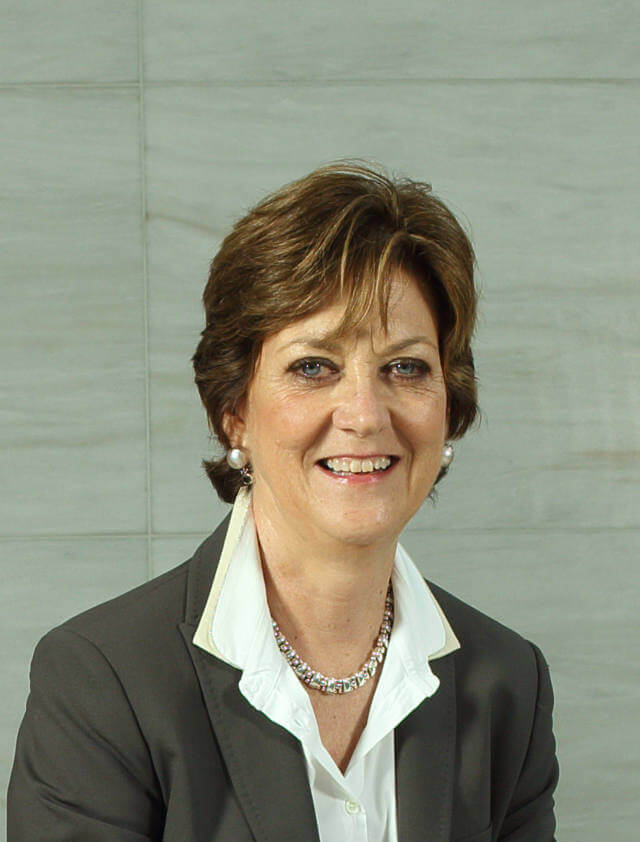 Sally MacConnell - At Johns Hopkins since 1983
Sally MacConnell - At Johns Hopkins since 1983 Senior Vice President of Facilities, JHHS
-
In my opinion, the most complex building types are found in an academic medical center because these buildings must perform for so many different constituencies and in so many different ways — support research, state of the art infection control and human beings, many of whom are very fragile for many different reasons. I came to Johns Hopkins to help plan, design and build complex buildings.
-
I have stayed for 35 years because of Johns Hopkins Medicine’s incredibly dedicated staff who work so hard to take care of patients and their families each and every day and who dedicate their lives to furthering cutting edge medical research.
-
I was promoted from heading up the design and construction division of The Johns Hopkins Hospital, to vice president of facilities for The Johns Hopkins Hospital, which included the ongoing day to day operations of the facilities, to senior vice president of facilities for the health system.
-
Planning, design and construction of Zayed-Bloomberg.
-
Perform each and every task and project you are assigned to the very best of your ability. Treat your staff, your colleagues, our patients and their families with respect. Hopkins is incredibly diverse; embrace that diversity and help it thrive.
Jessica Melton, M.H.A.
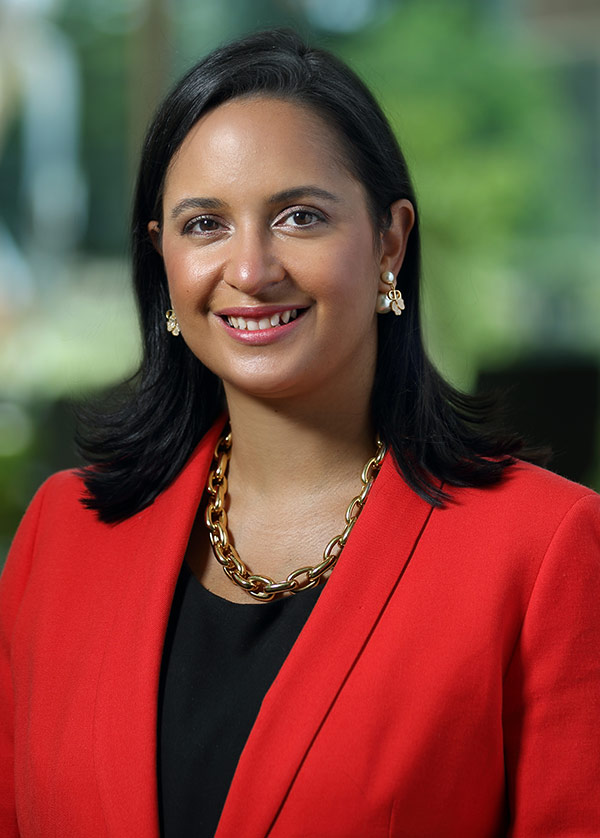 Jessica Melton - At Johns Hopkins since 2021
Jessica Melton - At Johns Hopkins since 2021 Vice President of Strategic Initiatives, Johns Hopkins Health System
-
Johns Hopkins Medicine is renowned for medical excellence and discovery, for investing in research and for developing lifesaving treatments. Johns Hopkins Medicine is committed to providing patient-centered care and improving the health of its communities. This mission, along with Johns Hopkins’ commitment to diversity and inclusion, made this role compelling. Each and every day, our employees and medical staff embody the core values of our organization. I see individuals from the front lines as well as those in essential support roles being kind to our patients, visitors and each other, going above and beyond to bring those personal touches to everything we do. I was born at Walter Reed Medical Center when it was in D.C., and spent part of my childhood in northern Virginia. Returning to the National Capital Region and giving back to this community has been especially fulfilling and rewarding.
-
I have been fortunate to have had exceptional mentors, both personally and professionally, who gave so generously of their time. When I was in graduate school, a professor supported me in designing an area of concentration that brought together my interests in emergency management, disaster preparedness and health equity. When I entered the health care administration field, I was fortunate to work and learn alongside leaders such as Kevin Sowers, president of the Johns Hopkins Health System and executive vice president of Johns Hopkins Medicine, and Carolyn Carpenter, president of the National Capital Region for the Johns Hopkins Health System. I also had inspiring role models, including my aunt, Dr. Vivian Pinn, who was the only woman and only African American in her graduating class at the University of Virginia School of Medicine. It is so important to have role models in whom we can see ourselves.
-
Some of the most meaningful accomplishments have come from paying forward the opportunities and mentorship I experienced. In 2020, my husband, Doug Melton, Ph.D., and I established an endowed scholarship at the UNC Gillings School of Global Public Health to provide women and minorities with support to pursue opportunities in health care leadership. I am active in mentoring and coaching women who are the first to attend college as well as creating a pipeline of minority leaders in health care. Giving back has always been important to my family, and it is so meaningful to be able to help pave the way for our up-and-coming women and minority leaders.
-
My advice is to always be true to yourself, to honor who you are and what is important to you. I have always sought out opportunities and people who share my core values of integrity, respect and inclusion. I lead as I like others to treat me. I especially tell women leaders that finding the perfect balance between work and home is not sustainable. Instead, I focus on being present in the moment, both at work and at home. It is important that I bring my full attention to the matter at hand, and that each individual is heard and seen. I am intentional in practicing mindfulness and gratitude. There is so much around us to be grateful for, both large and small, and often all it takes are small moments to pause and reflect to reset my perspective.
Redonda Miller, M.D., M.B.A.
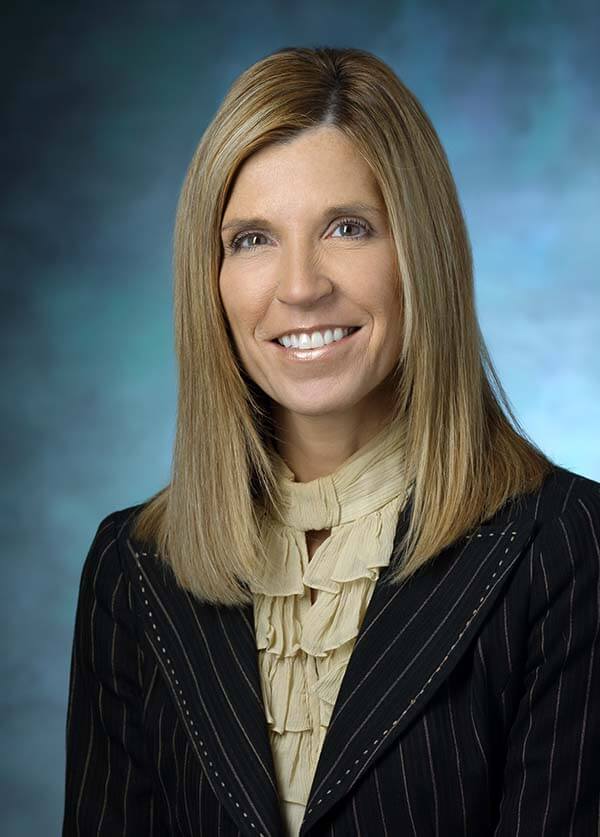 Redonda Miller - At Johns Hopkins since 1989
Redonda Miller - At Johns Hopkins since 1989 President, The Johns Hopkins Hospital
-
I came to Johns Hopkins as a medical student in 1988 and have worked here since graduating in 1992. I grew up in a small, rural town in Ohio, and the opportunities afforded by a world-class institution such as Hopkins were exciting and unparalleled. More importantly, when I visited for an interview, I could feel a true sense of camaraderie and collegiality among classmates. I knew instantly that I wanted to be part of Hopkins’ culture of collaboration and excellence.
-
Nearly three decades after I first set foot on the Hopkins campus, it remains the perfect fit for me. I am continually inspired by the people here – of Johns Hopkins Medicine – as they are what make this place so special. Everyone is committed to working with and learning from each other and dedicated to excellence in everything we do, whether patient care, research or education.
-
After a decade as a clinician-educator, I became interested in improving our clinical operations and health care delivery, which led to the pursuit of an M.B.A. After receiving my degree, I met with the chair of medicine and asked for a project where I could use my new skills. My successful completion of that assignment led to my first administrative role. Hard work on various projects led to positions of increasing responsibility over time. In addition to sweat equity, I have found that bringing colleagues together and ensuring that their ideas and opinions are valued is key to advancement.
-
As senior vice president of medical affairs, I helped bring medical staff leadership together to integrate our work across the system. We were able to advance strategic efforts, such as the centralization of credentialing and coding and the development of a coordinated pharmacy formulary management process. This integration of our work helped to improve and ensure consistency of care for our patients across the health system.
-
First, let others know about your career aspirations. People in positions of leadership can help provide opportunities for you, but only if they know what your career interests and goals are. Second, when opportunities arise, be sure to say yes to new projects and to apply for new positions, even if you are anxious about your abilities or lack confidence. Push yourself past your comfort zone and toward your goals.
Jennifer Nickoles, M.S.
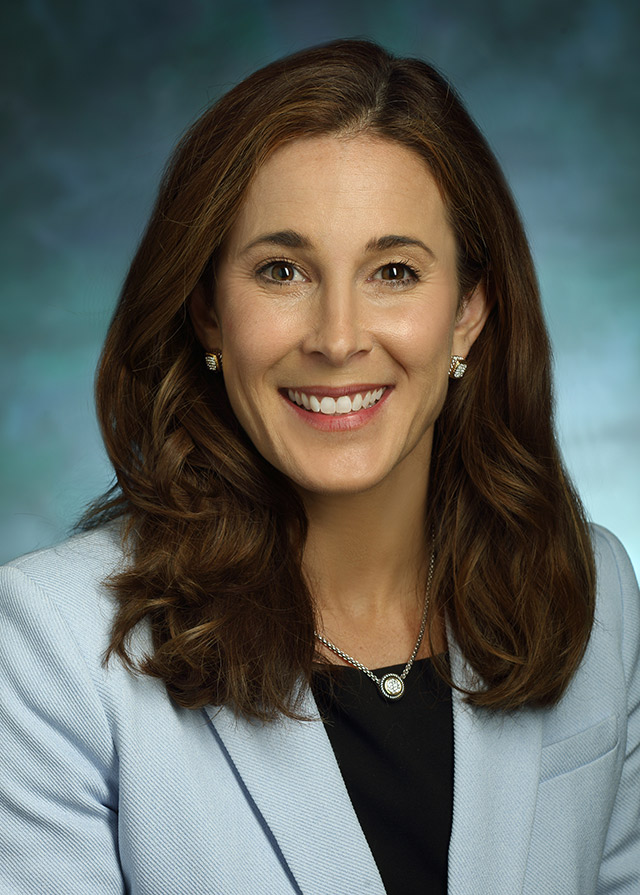 Jennifer Nickoles - At Johns Hopkins since 1997
Jennifer Nickoles - At Johns Hopkins since 1997 President, Johns Hopkins Bayview Medical Center
-
My introduction to Johns Hopkins Medicine was as an architectural contractor working on space planning for facilities management and as a Johns Hopkins University undergraduate studying business and management. As part of my space planning job, I walked nearly every square foot of this place and interacted with almost every department. My intention was to pursue a position in international business after I received my degree, but the facilities team offered me a position before then. By the time I graduated, I was being offered my first management role, and I could envision my future here as a leader.
-
If you’re going to dedicate your time, talents and energy to a place, you need to be inspired by the mission and connected in meaningful ways to the people. Like most of us who work here, the mission and the people are why I stay. We have the unique ability to impact so many by helping and healing them, pioneering medical and scientific innovations, teaching generations of doctors and scientists, and sharing knowledge with the world. I get to work with smart, talented colleagues who encourage me when I want to grow and who have supported me when I wanted to take a step back to raise my four boys.
-
I came up through the ranks of Johns Hopkins Medicine; constantly seeking increased responsibility, complexity and diversity of experience over 20-plus years. After my position in facilities, I moved onto a budget analyst job in nephrology, then to a division manager position in rheumatology, and to an assistant administrator for pulmonary and critical care medicine. I also worked on countless projects and budgets, with hundreds of faculty, staff and trainees on multiple campuses. From there I became the director in the school of medicine vice dean’s office and gained the institutional experience to become the chief of staff.
-
I could list a project or initiative, but I am most proud of the people I mentor and the teams I’ve helped to develop. Regardless of your role, we all have an opportunity to learn from those ahead of us, but we have a real responsibility to teach those who aspire to grow. You don’t need a special title to commit to promoting others. The true lasting legacy of a leader is measured by succession; how well he/she invested in others who will, in turn, become multipliers who add value to others and the entire organization.
-
It may seem obvious, but start by focusing on mastering your current role and performing consistently well. Innovate as much as you can within your scope of responsibility, and raise your hand when you’re ready for a new challenge. A lot of my experience was gained through service on committees and workgroups that provided institutional exposure. Don’t be afraid to take a risk by accepting something outside your comfort zone. As a leader, you need to develop a holistic view of the organization and become more comfortable with ambiguity. Lastly, find sponsors, mentors and friends to support you along the way.
Maria Oliva-Hemker, M.D.
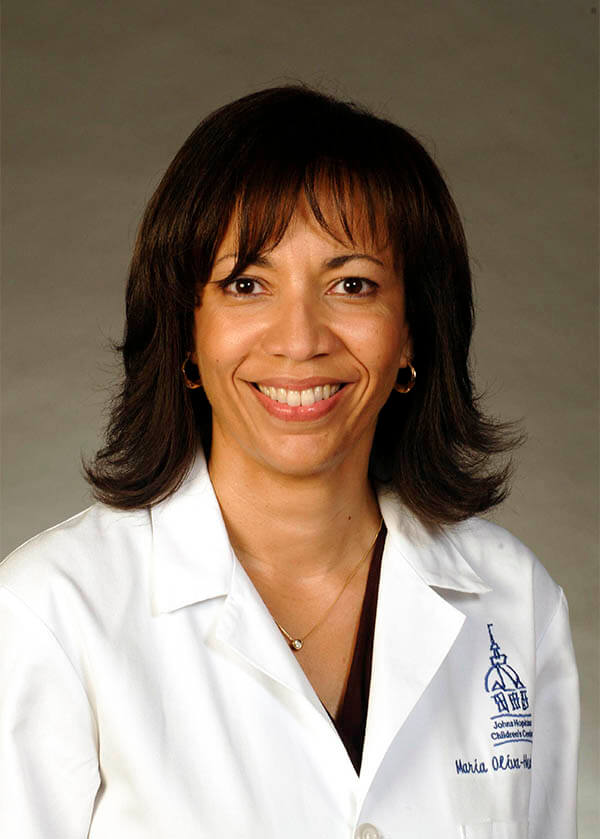 Maria Oliva-Hemker - At Johns Hopkins since 1993
Maria Oliva-Hemker - At Johns Hopkins since 1993 Director, Pediatric Gastroenterology, Hepatology and Nutrition
-
Hopkins’ reputation and its focus on achieving excellence in clinical care, research and education. Rather than being complacent with doing one thing well, I think it is important that Hopkins highlights all three of these areas in medicine in its mission. I also was attracted to the sense of history that one gets walking the halls of Hopkins. There is a certain pride that comes with knowing the impact that this institution has had on the history of medicine and with that pride comes a desire to be part of the institution and move it forward.
-
By far it has been the people. The colleagues who I am surrounded by are passionate about the work that they do and they want to do things very well. They go the extra mile for their patients and their research, and are collegial to those around them. They tend to be altruistic and know how to make things happen even in underresourced environments.
-
My goals were not to reach a leadership position, but to be the best physician I could be and add knowledge to my specialty. In striving for those goals, I was able to reach my current leadership opportunities when they became available. In my Hopkins career I felt that several experiences provided me with leadership training that I have been able to use to reach and continue in my current position: Exposure to high level leaders at the school of medicine and Johns Hopkins Hospital during my tenure as faculty senate chair and on the CPA; Johns Hopkins University and school of medicine leadership courses; and mentorship from women leaders.
-
Development of a Pediatric Inflammatory Bowel Disease Center that has achieved national recognition. Leading the division to be viewed as top pediatric GI group nationally. Expanding the size and scope of my division (more than doubling the size of the faculty, providing the highest volume of clinical care in the division’s history while maintaining a strong academic/research focus).
-
See yourself as a leader. Be willing to “take a seat at the table.” Find people who will support and encourage you. Network. Surround yourself with great people. Communicate effectively – learn when to speak up and when silence is needed. Stand up for what you believe in. Be your authentic self. Keep the big picture in mind. Take responsibility for your actions.
Jenine Rabin, B.A., M.B.A.
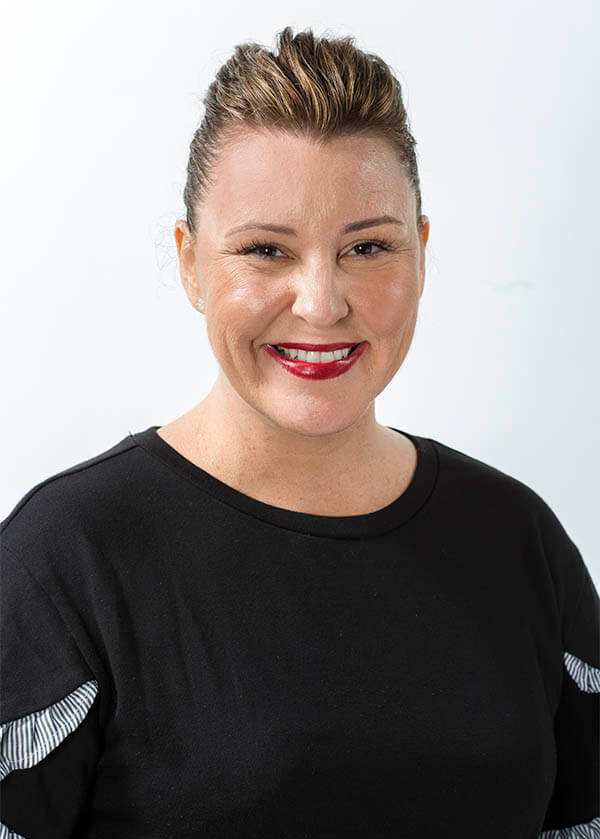 Jenine Rabin - At Johns Hopkins since 2012
Jenine Rabin - At Johns Hopkins since 2012 Executive Vice President, Johns Hopkins All Children’s Foundation
-
I wanted to make a difference in transforming pediatric health care in Florida and the country, and I knew that by leading the Johns Hopkins All Children’s Foundation I had the opportunity to make that happen.
-
I am inspired by the mission, my fellow colleagues and staff.
-
I have been in my field for 22 years and had the good fortune of being around good leaders who gave me opportunity and noticed my strengths and skills. My current position is a result of that evolution.
-
I am most proud of the team that I have recruited and coach and learn from each day and some of the transformational gifts that we are raising to help with our academic transformation.
-
You possess ideas and skills that you likely undervalue. Speak up. Say things that are on your mind that you think will help move your area ahead, or will clarify confusion, or will get a project moving. Leaders like to see other leaders emerge. We will see you if you step out and help you on your path.
Cynthia Rand, Ph.D.
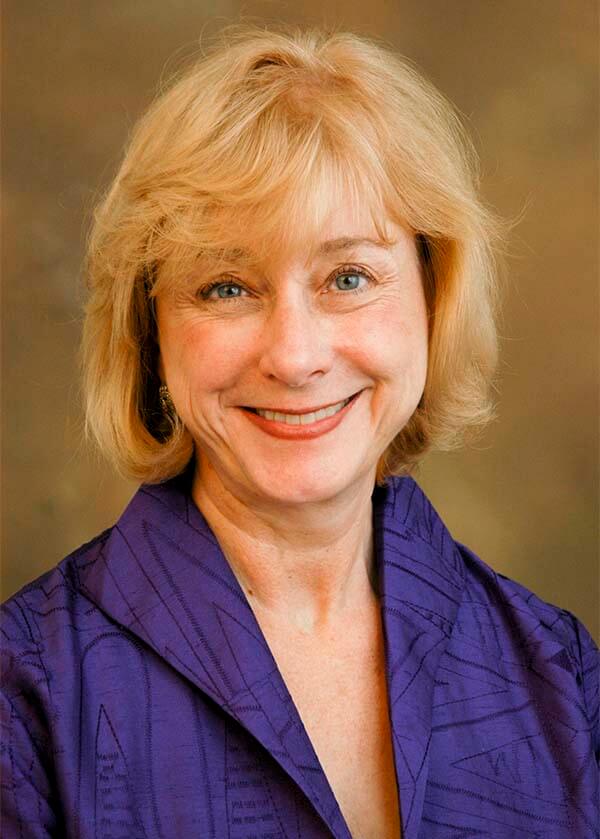 Cynthia Rand - At Johns Hopkins since 1991
Cynthia Rand - At Johns Hopkins since 1991 Senior Associate Dean for Faculty Professor of Medicine
-
I came here for graduate school, remained for my postdocs and opportunities opened up to join the faculty.
-
The caliber of research being done at Hopkins is clearly world-class, but just as importantly, so are the people. The collegiality of my Hopkins colleagues is astonishing — everyone’s door is open, collaboration is easy and people are very generous with their time.
-
My first significant leadership role was chairing the Department of Medicine Women’s Task Force (TF), which I had joined early in my Hopkins career because of my passion for advancing the careers of women in medicine. My work with the TF led to additional opportunities to serve committee leadership roles at the department of medicine and school of medicine level. In parallel with these roles, I became increasingly engaged with mentoring faculty from across the school of medicine. These interests and my experience eventually led to my current role as senior associate dean for faculty.
-
I’m most proud of the achievements of my mentees – their accomplishments humble me.
-
Be highly selective about what you commit to, but when you commit, deliver results. Build consensus when asked to lead, be inclusive and seek out diverse opinions and perspectives in developing solutions. Seek to understand and meet the goals and priorities of senior leaders — effective leadership is not solely about leading and managing those who report to you; it’s equally about serving and advancing leadership and institutional goals. And in all things, try to be kind.
Cory Sandone, M.A., C.M.I.
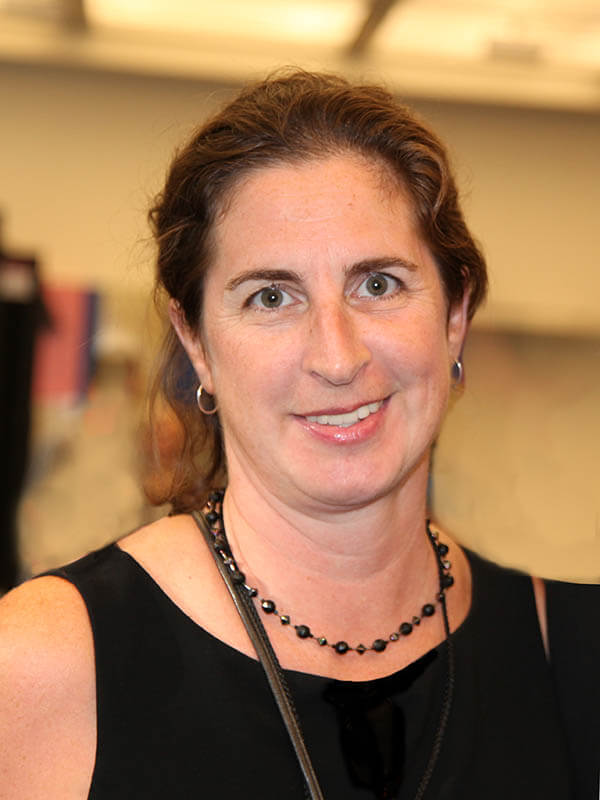 Cory Sandone - At Johns Hopkins since 1988
Cory Sandone - At Johns Hopkins since 1988 Director, Department of Art as Applied to Medicine
-
I trained here, receiving my master’s degree in medical illustration. Following graduation I accepted a position here doing surgical illustration. My roles have evolved, including teaching, becoming director of our graduate program and recently director of our department.
-
There is so much great work being done in the labs and the clinics at Hopkins! Art as Applied to Medicine is considered a creative department, and we collaborate with colleagues in many other departments. I see the same levels of creativity and brilliant problem-solving being practiced by many at Hopkins.
Our graduate program is one of only four in North America, and we attract the very best students! -
I participated in the Leadership Development Program in 2009 at the urging of Janice Clements. I had a chance to practice leadership while directing our graduate program and then serving as president of my professional association. When I was asked to serve as interim director of our department, I felt ready to accept that challenge. It gave me the opportunity to consider and get a feel for the role of director.
-
The variety of relationships I have been able to develop with diverse groups at Hopkins, from promising students, to dedicated faculty and staff, to colleagues who share the challenges and joys of leadership.
-
When you accept a new opportunity, find a way to pass off a responsibility you’ve been carrying to a colleague who would benefit from the leadership experience that responsibility provides.
K. Alicia Schulhof, M.H.A., F.A.C.H.E.
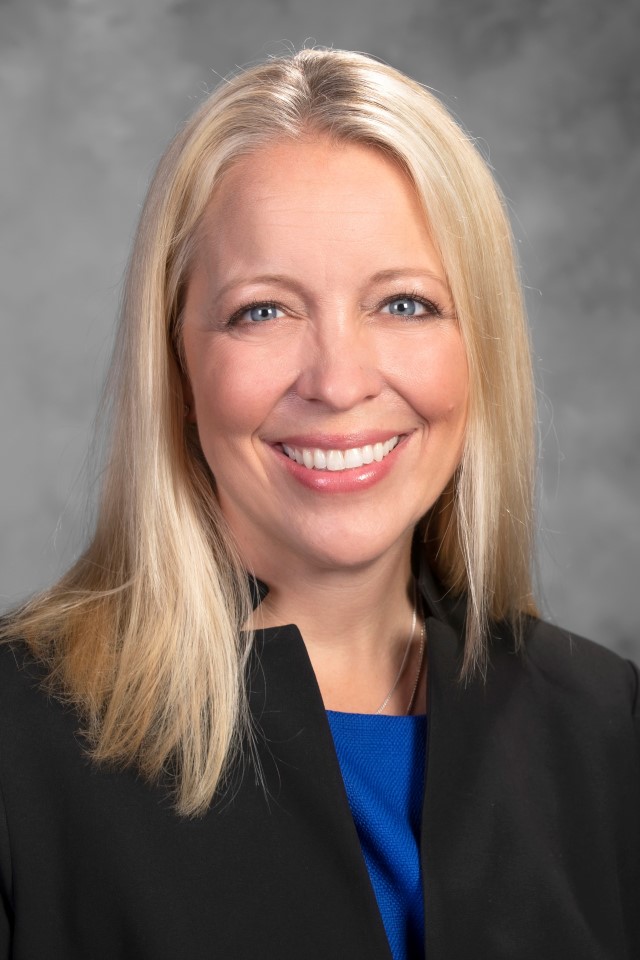 K. Alicia Schulhof - At Johns Hopkins since 2021
K. Alicia Schulhof - At Johns Hopkins since 2021 President, Johns Hopkins All Children's Hospital
-
I was and continue to be drawn to Johns Hopkins Medicine and Johns Hopkins All Children’s Hospital because of the mission, the reputation and brand, and most notably, the people. It is truly a culture of connection woven together by an extraordinary team. Johns Hopkins All Children’s Hospital is a beacon of hope for healing, and plays a vital role in growing and developing healthy communities. I am confident that together with Johns Hopkins Medicine, Johns Hopkins All Children’s will continue to shape the future of children’s health not only locally but on a national scale, and there is no greater privilege in life than to help grow our next generation.
-
I have been fortunate to experience a variety of health care settings across the country. In the first decade of my career, I was trained by exceptional hospital operators with the rigor of the for-profit setting. As chief operating officer, I learned the importance of data-driven decision-making and asking good questions. The second decade of my career, I fell in love with the academic setting and was immersed in research and education. I served in both operations as chief operating officer and president, responsible for a group of three hospitals. I also got the opportunity to gain experience in system executive management, leading process improvement and serving on the senior leadership team of one of the nation’s largest health systems.
-
I am proud of the teams I have had the honor of working with and the growth and success we have had together, personally and professionally. The other team I am proud of is my family. We work really hard each day, and we play hard as a family, too. I think it is important to foster those key philosophies and elements of teamwork in all dimensions of our lives.
-
Be true to yourself, follow your heart and have a relentless pursuit of excellence. What seems impossible can be possible when you immerse yourself in the company of results-driven, intellectually curious, values-based, servant leaders. Be willing to take risks, be trustworthy, lead with integrity, find good mentors and be a good mentor. Ask a lot of questions, and seek to understand before making decisions.
Geraldine Seydoux, Ph.D.
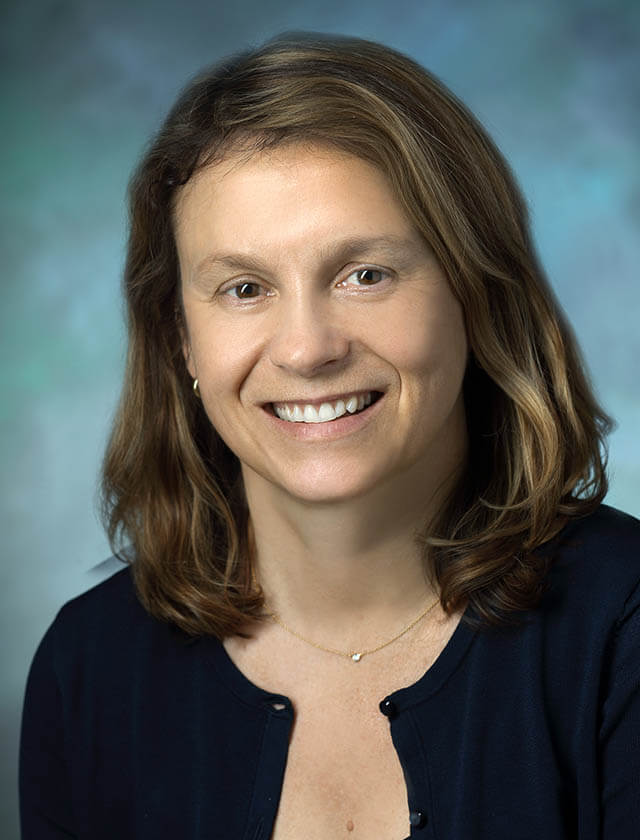 Geraldine Seydoux - At Johns Hopkins since 1995
Geraldine Seydoux - At Johns Hopkins since 1995 Huntington Sheldon Professor of Medical Discovery
Vice Dean for Basic Research
HHMI Investigator
-
Collegiality of the faculty. I had a chance to consider other institutions with great science and resources, but Hopkins stood out by far as having the most friendly, supportive and welcoming faculty!
-
My long-lasting friendships with my colleagues at Hopkins. The AWESOME students!
-
The dean’s office called. It was hard to refuse an offer to give back to the institution that nurtured me all these years.
-
My students! I have a shelf above my desk where I collect their Ph.D. theses – I can look up and feel proud.
-
Look around you. There are many wonderful role models. Watch them, ask for their mentorship and let them know you are interested in leadership. Be ready to say yes when the call comes. It’s never the perfect time, but it can be the right time.
Megan Kasimatis Singleton, J.D., M.B.E, C.I.P.
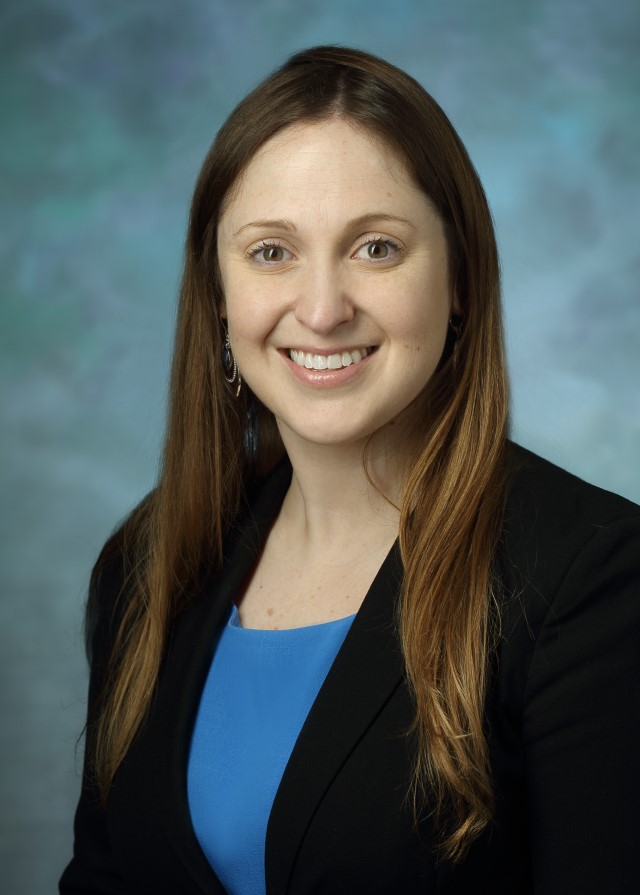 Megan Kasimatis Singleton - At Johns Hopkins since 2016
Megan Kasimatis Singleton - At Johns Hopkins since 2016 Associate Dean for Human Research Protection and Director of the Human Research Protection Program
-
When I first joined Johns Hopkins Medicine, the landscape related to human research protection was changing with the introduction of new requirements for single Institutional Review Board (IRB) review of multisite research. Johns Hopkins Medicine offered me the opportunity to be at the forefront of creatively implementing solutions to address these changes. I was excited to take a leadership role in addressing these new challenges and contribute to the growth of the human research protection program at Johns Hopkins Medicine.
-
I find great personal and professional satisfaction in having the unique opportunity to work closely with an incredible group of IRB members, chairs and staff who are committed to advancing our core mission of protecting participants in research while enabling important scientific discovery. My colleagues across our research enterprise remind me continuously of the importance of the work we do, how much we contribute to the advancement of ethical research and how research at Johns Hopkins Medicine positively impacts the patients and communities we serve. I am re-invigorated constantly by the purpose of our work and the people who I have the opportunity to work with.
-
By saying “yes” to projects that interested and challenged me — I approached each opportunity as a potential for growth. Some opportunities provided a network of new colleagues, others offered an opportunity to be exposed to new ideas. I wanted to be in a position to help others advance research and welcomed opportunities to enhance my ability to do so. I also had the benefit of working for and with women in leadership positions as my career developed. These experiences positively shaped how I viewed leadership and its possibilities. My mission as a leader is to inspire and encourage others, and to promote creativity and innovation in thinking and problem solving.
-
I am very proud of our IRB’s response to the COVID pandemic. At a time when advancements in research have been critical to public health, we moved quickly to stand up an emergency response IRB. Through the commitment of our IRB members and staff and close collaboration with our research community, we reviewed and approved more than to 600 COVID-related protocols (as of Dec. 28, 2021). We did so without sacrificing our commitment to human research protection. I’m proud of the work we were able to accomplish and the close relationships we built with the research teams conducting this important work.
-
Be who you are, not who you believe you are expected to be. Often your true strengths may be overshadowed if you tailor your unique gifts and talents to fit the mold of what you believe leadership looks like. New ideas and new talent are needed and push us to be better.
Kimberly Skarupski, Ph.D., M.P.H.
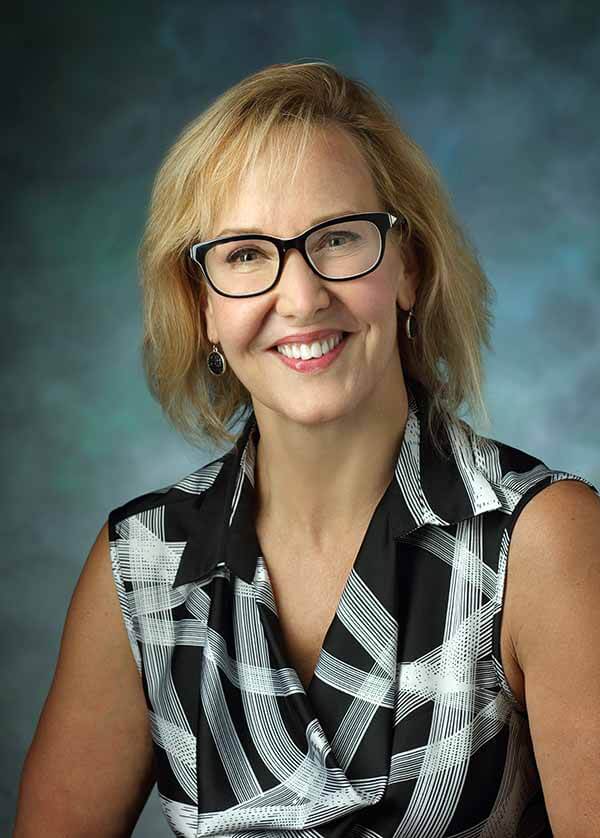 Kimberly Skarupski - At Johns Hopkins since 2013
Kimberly Skarupski - At Johns Hopkins since 2013 Professor and Senior Associate Dean for Faculty Development
-
Johns Hopkins Medicine is the preeminent institution in academic medicine, world-renowned for excellence in education, research and patient care. When I met my future colleagues at a conference, I knew I wanted to serve with them — I’ve never worked in an institution that was more collegial, collaborative, smart or generous.
-
My colleagues and my leaders inspire me every day to serve our faculty to the best of our ability. I love our faculty members. This is my family.
-
I started as a researcher-educator in gerontology and epidemiology; I didn’t know anything about academic affairs or faculty development. About 12 years ago, I assumed a 50 percent program director position to run a Research and Teaching Mentoring Program at Rush University Medical Center in Chicago. For seven years, I grew the mentoring program and my percent effort also gradually increased until I was doing faculty development almost full time. Then I saw the posting for assistant dean for faculty development at Hopkins and realized that it was everything I was currently doing, so I applied!
-
WAGs (writing accountability groups)! I’ve started more than 100 WAGs in the schools of medicine, nursing and public health. WAGs are small groups of folks (four to eight) who meet for an hour once a week for 10 weeks to help establish a sustainable writing habit. They really work and people love them! WAGers report increased writing frequency (write more regularly), shorter writing session durations (write for less time), greater control over the writing process and time management, and the bonus is that they build a small community of engagement and social support.
-
“Knowing yourself is the beginning of all wisdom.” (Aristotle) Carve out time to do some deep-diving into who you are, and identify your strengths and your challenge areas. Take some faculty development courses and participate in leadership programs. You are already very powerful and you are already a leader (you’re at Hopkins — you’ve already accomplished so much)! Allow us in the Office of Faculty to help you recognize, embrace and establish your own leadership identity!
Inez Stewart, M.Ed.
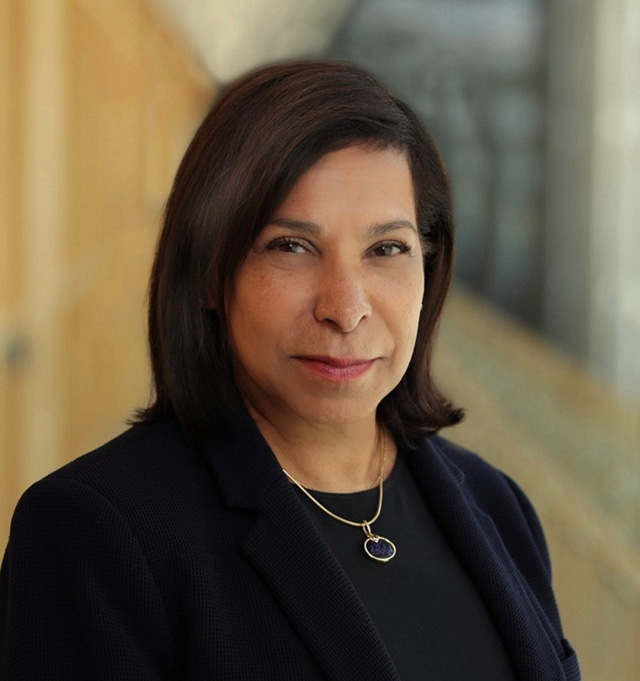 Inez Stewart - At Johns Hopkins since 2017
Inez Stewart - At Johns Hopkins since 2017 Senior Vice President of Human Resources
-
I wanted to work for a world-renowned health care enterprise where I can lead the strategy to accelerate the integration of human resource policies and programs across the health system.
-
It’s all about the mission and the work we do here. Our people, and the breakthroughs and innovations we are working on, are amazing. I may not be involved in the primary research and clinical care, but to be involved in an organization that is truly moving health care forward is exciting and rewarding.
-
I have always taken on new challenges and opportunities and have never been afraid of taking risks in my career. I am aware of how my position in human resources supports the organization’s strategic plan and leadership, and that has allowed me to be in broader roles than what is traditional in human resources. I’ve taken lots of risks and worked in multiple industries, which broadened my perspective. For example, I was not afraid to move overseas to take on a new responsibility. I’ve challenged myself to not get stuck, and so I pushed myself to learn and grow in order to be ready for the next opportunity.
-
Due to my short tenure at Johns Hopkins Medicine, it’s too early to celebrate accomplishments. However, we are in the process of reorganizing and reaffirming the human resources/people strategy and structure, which is central to delivering the appropriate human resources services and programs to the organization. In addition, we launched the HR Solutions Center to provide on-demand response and support to managers and employees. We are currently embarking on a systemwide initiative to reaffirm our values as an organization and continue to strengthen our workplace culture.
-
It is important for all of us, as women, to be confident in our capabilities and to be self-assured in how we do our jobs and how we are valued in our positions. In most cases, women hold back and are shy about being assertive as it relates to career advancement. Over the years, I’ve learned that no one is going to do that for you. You have to be able to do that for yourself. You also have to be a risk-taker and be thoughtful about the opportunities presented to you so that you can take on new things, grow and expand your portfolio of skills.
Akila Viswanathan, M.D., M.P.H.
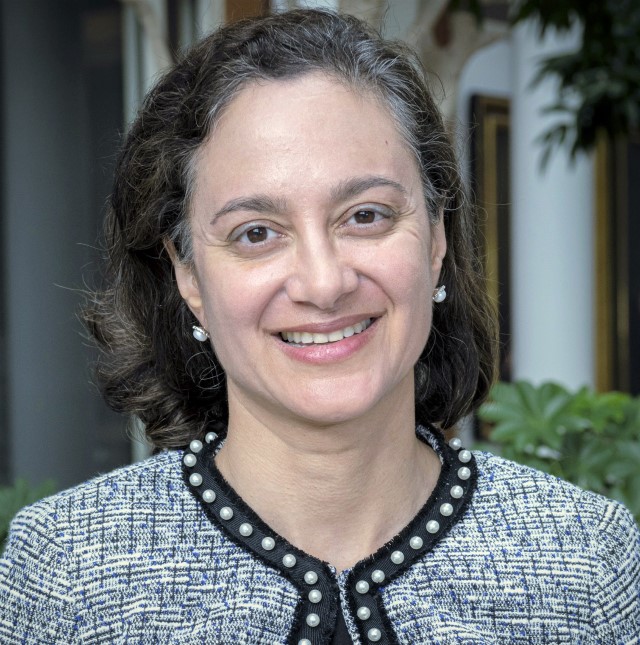 Akila Viswanathan - At Johns Hopkins since 2016
Akila Viswanathan - At Johns Hopkins since 2016 Director, Department of Radiation Oncology and Molecular Radiation Sciences
-
Johns Hopkins Medicine provides resources and opportunities to ensure the success of cutting-edge clinical care at the pinnacle of innovation, research and outstanding quality, resulting in the best outcomes for patients.
-
Working as a department director gives me an opportunity to serve the institution in supporting the mission of outstanding clinical care, research and education.
-
My career has been dedicated to the care of women with gynecologic cancers and to developing innovations in brachytherapy. Having served in educational, clinical and research leadership roles for two decades, I was first recruited to Hopkins to serve as executive vice chair. After a national search, I was then selected to be the department director for radiation oncology.
-
Supporting the faculty to thrive in academic careers has been the most rewarding aspect of being department director. I have been fortunate throughout my career to have opportunities that have been fulfilling, such as director of the medical student rotation at Harvard Medical School, director of the gynecologic cancer program in radiation oncology at both Harvard and Johns Hopkins, and chair of the education committee at ASTRO (the American Society for Radiation Oncology). I have had serial NIH funding starting with a K07, then R21 and R01 grants, focused on developing innovations that will improve care and outcomes for women with cervical cancer. For accomplishments in brachytherapy, I was recently awarded the Ulrich Henschke Award by the American Brachytherapy Society [the highest honor the society bestows on a practitioner]; I served as president of the society and chair of the board of directors from 2013–15.
-
Ensure that you maintain a network of mentors and sponsors who appreciate and support your aspirations and abilities. Reach out to form new relationships with leaders who are men and women in diverse areas. Collaborate with team members over projects that inspire you. Pursue what comes naturally — questions that keep you thinking and that you find intriguing are good signs to go forward into an area.
Cynthia Wolberger, Ph.D.
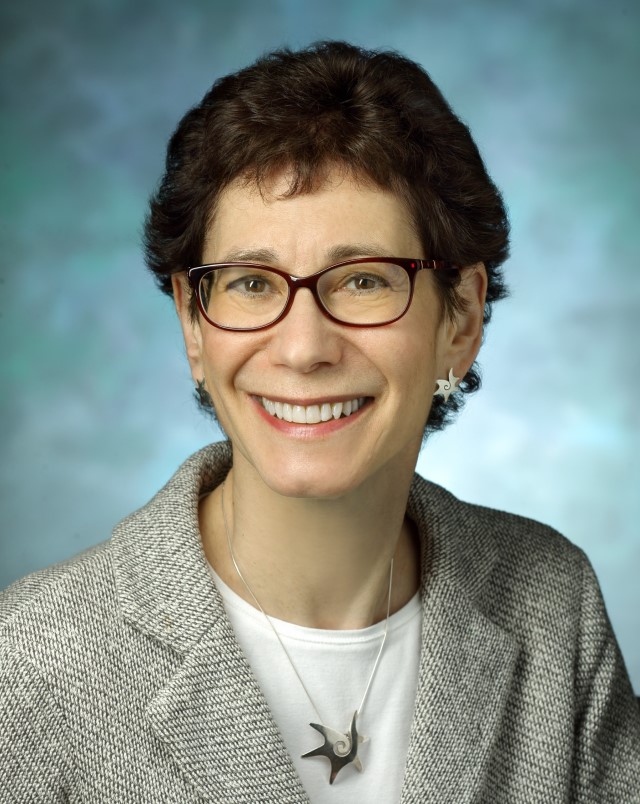 Cynthia Wolberger - At Johns Hopkins since 1991
Cynthia Wolberger - At Johns Hopkins since 1991 Director of the Department of Biophysics and Biophysical Chemistry
-
I was drawn by the collegiality and outstanding scientists here.
-
I have a terrific group of colleagues and a collaborative research environment that is second to none. Over the years, I have collaborated with a variety of colleagues across the university and continue to establish new collaborations that take our research to new levels.
-
During my years at Hopkins, I have been involved in a variety of committees and task forces that were aimed at promoting the careers of women and basic science research in the school of medicine. When the director of my department decided to step down, I thought it was time to toss my hat into the ring and work on these issues in a new capacity. I am excited about the opportunities afforded by this leadership position.
-
My students and postdoctoral fellows! I take tremendous satisfaction in seeing them flourish and advance in their careers after they leave Hopkins. I am so proud of all of them.
-
Take advantage of opportunities to serve on school and university-wide committees, and say yes if you are asked to help lead one. Seek mentors among women leaders at Hopkins and ask them for advice and feedback. And don’t be shy about asking! I have yet to meet a senior faculty member who said no to a junior colleague who was seeking advice. I am indebted to multiple women leaders at Hopkins who served as role models and provided me with advice and guidance over the years.

